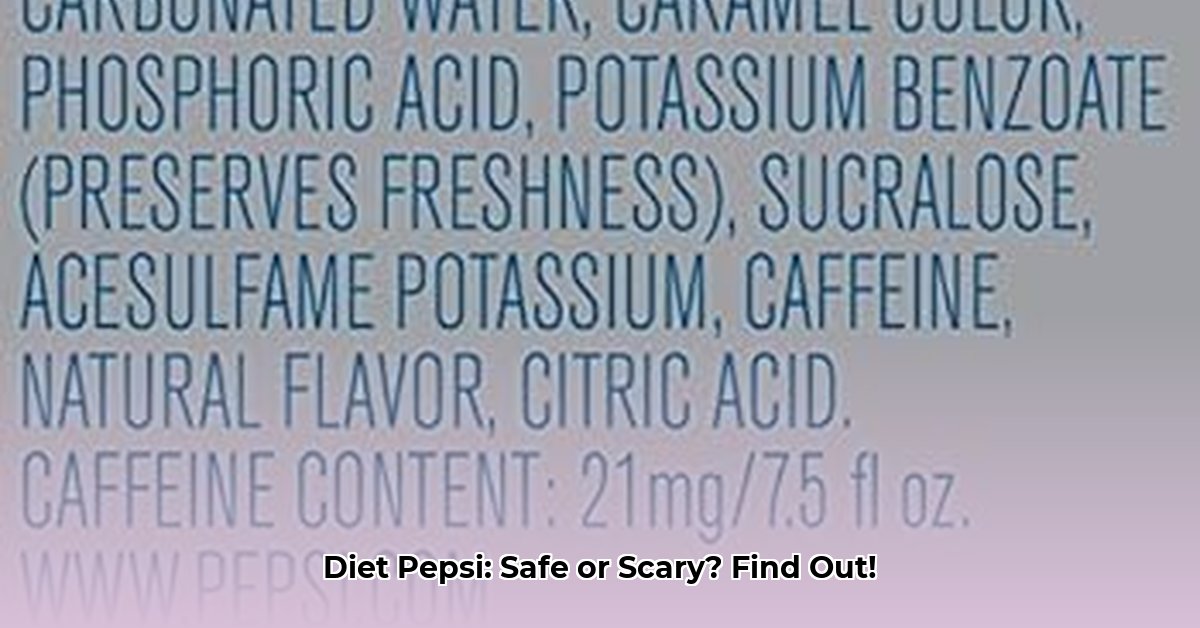“`markdown
Is Diet Pepsi Safe? Ingredient Analysis & Health Impact
Ever wondered what’s *really* in that Diet Pepsi you grab from the fridge? We all know it’s supposed to be the guilt-free soda, but let’s get beyond the marketing hype. This article dives deep into the ingredients, explaining what they are, what they do (and don’t do!), and what the experts say about their potential effects on your health. We’ll compare it to other sodas, break down the label so you can understand it yourself, and offer some simple tips for making smarter choices about your drinks. We’ll look at both the good and the bad, so you can make up your own mind about whether Diet Pepsi fits into a healthy lifestyle.
For alternatives, check out this list of diet drinks without aspartame.
Diet Pepsi Ingredients and Health Concerns: A Deep Dive
So, you’re curious about what’s actually in that Diet Pepsi? Let’s crack open the can (metaphorically, of course) and take a closer look at the ingredients, their potential effects, and what it all means for your health. Forget the overly technical jargon – we’ll keep it simple and straightforward, specifically addressing Diet Pepsi ingredients and health concerns.
Artificial Sweeteners and Potential Side Effects: A Close Examination
The most noticeable things in Diet Pepsi are the artificial sweeteners. These are the stars of the show, providing that sweet taste without all the sugar. You’ll typically find aspartame and acesulfame potassium. But here’s the thing: while regulatory agencies deem them safe within acceptable daily intake levels, some people report experiencing headaches, dizziness, or gastrointestinal issues after consuming products containing these sweeteners. Are artificial sweeteners and potential side effects a real concern? Some studies suggest potential links between artificial sweeteners and changes in gut bacteria, glucose metabolism, and even weight gain, though more research is needed to fully understand these connections. The long-term effects are still being studied, and what might be perfectly fine for one person could cause problems for another. It’s a bit of a balancing act – the sweetness comes at a price, and that price could be different for everyone. Individuals with phenylketonuria (PKU) must avoid aspartame due to its phenylalanine content.
Acidity, Preservatives, and Natural Flavors: Understanding Additives
Diet Pepsi isn’t just sweeteners. It’s a whole cast of ingredients playing their part. Citric acid and phosphoric acid give it that characteristic tartness and zing you enjoy. Phosphoric acid, while contributing to the flavor, can also potentially erode tooth enamel and, with excessive consumption, interfere with calcium absorption. Potassium benzoate acts as a preservative, keeping everything fresh on the shelf. But, there’s a wrinkle – some research suggests potassium benzoate might contribute to the formation of benzene, a cancer-causing substance. However, the FDA assures us that the amount in Diet Pepsi is extremely low and within safe limits. Is there a health risk concerning acidity, preservatives, and natural flavors? Then there’s caramel color, which gives Diet Pepsi that familiar brown hue. A byproduct called 4-MEI (4-methylimidazole) is formed during caramel color production. Regulatory agencies generally deem the levels in Diet Pepsi safe, but some studies suggest potential health concerns with higher levels of 4-MEI. Finally, we have “natural flavors.” That’s where things get a little fuzzy. “Natural flavors” is a pretty vague term. Exactly what natural flavors are included is often a company secret, which leaves some people feeling a little uneasy about what they’re actually drinking.
Decoding the Label: A Step-by-Step Guide to Understanding Ingredients
Reading a Diet Pepsi ingredient list can feel like trying to understand ancient hieroglyphics. But, don’t worry, we’ll break it down for you. Let us guide you in decoding the label with this step-by-step guide:
- Carbonated Water: The base of Diet Pepsi, providing the fizz. Generally considered harmless.
- Artificial sweeteners: These are the main event. Pay close attention to which ones are used, as individual reactions can vary wildly. Aspartame, for example, needs to be avoided by people with PKU.
- Acids (Citric and Phosphoric): These give Diet Pepsi its tangy kick, but consuming too much acid can potentially damage your tooth enamel. So, moderation is key. Phosphoric acid can also interfere with calcium absorption.
- Preservatives (Potassium benzoate): These keep your Diet Pepsi fresh, but remember the potential benzene concern – although the amounts are likely very small and considered safe by regulatory agencies.
- Caramel Color: Adds the classic brown coloring. A byproduct called 4-MEI (4-methylimidazole) is formed during caramel color production.
- Natural Flavors: The mystery ingredient. The label doesn’t usually tell you what these are, fueling some consumers’ concerns about transparency.
- Caffeine: A stimulant that provides an energy boost. Be mindful of your daily caffeine intake.
Risks and Benefits: A Balanced Approach
While Diet Pepsi is generally considered safe by the FDA, it’s not a simple “good” or “bad” situation. Do the risks and benefits truly balance out? The truth is, we don’t have all the answers yet, especially regarding long-term health effects of the artificial sweeteners and other additives. Some research has suggested potential links to health issues, while other studies haven’t found any cause for concern. More research is definitely needed. One benefit is that Diet Pepsi, being calorie-free, can be helpful for individuals managing their weight or blood sugar levels. So, the wisest approach is to enjoy Diet Pepsi in moderation, rather than making it a daily habit.
Informed Choices and Moderation: A Path to a Healthy Lifestyle
Understanding the ingredients in Diet Pepsi allows you to make informed decisions about your beverage choices. How do we make informed choices and practice moderation as part of a healthy lifestyle? The absence of sugar is a big plus for many people managing their weight or blood sugar, but the artificial sweeteners and other additives raise some questions. It’s a trade-off. The key is to be aware of those potential trade-offs and drink responsibly. It’s all about balance – enjoying your Diet Pepsi occasionally while keeping an eye on your overall diet and lifestyle. Remember, reading labels carefully and making conscious choices is a crucial part of maintaining a healthy lifestyle. And, if you have specific health concerns, it’s always best to chat with your doctor or a registered dietitian. They can give you personalized advice based on your individual needs and circumstances.
Aspartame and Long-Term Health: A Scientific Review
Diet Pepsi, like many diet sodas, uses artificial sweeteners to deliver sweetness without the calories of sugar. But what’s the long-term cost? Let’s delve into the science surrounding aspartame, a key ingredient in Diet Pepsi, and its potential impact on your health by analyzing aspartame and long-term health.
Decoding Aspartame: Safety and Potential Impacts
Aspartame is an artificial sweetener roughly 200 times sweeter than sugar. It’s broken down in the body into aspartic acid, phenylalanine, and methanol. While generally considered safe by regulatory bodies like the FDA and EFSA (European Food Safety Authority) within established Acceptable Daily Intake (ADI) levels, the long-term effects remain a topic of ongoing research and debate. How can we accurately decode aspartame to understand it’s safety and potential impacts?
Studies have yielded mixed results. Some observational studies suggest potential links between high aspartame consumption and certain cancers, cardiovascular issues, or even neurological effects. However, many other studies, including large-scale reviews and meta-analyses, haven’t found a clear causal connection between aspartame consumption within the ADI and adverse health outcomes. The discrepancies often stem from varying methodologies, sample sizes, study populations, and the complexities of isolating aspartame’s effects amidst other dietary and lifestyle factors. It’s like trying to solve a complex equation with too many unknown variables. It’s important to note that individuals with phenylketonuria (PKU) must avoid aspartame due to their inability to metabolize phenylalanine, one of its breakdown products.
Acidity and Dental Health: A Hidden Risk
Beyond aspartame, Diet Pepsi’s acidity is another concern. What is the real connection between acidity and dental health? The high acidity levels, primarily due to phosphoric and citric acid, contribute to tooth enamel erosion, increasing the risk of cavities and dental sensitivity. This is a widely acknowledged fact, regardless of the sweetener used.
Other Additives: Unveiling the Unknown
Diet Pepsi contains other additives like caramel coloring (sometimes containing 4-methylimidazole or 4-MI) and various flavorings. Are there long-term issues from other additives in Diet Pepsi? The long-term effects of these additives, and their combined interaction with aspartame, are not fully understood. While regulatory agencies generally deem these additives safe at the levels found in Diet Pepsi, some studies have raised concerns. For example, some research has linked 4-MI to cancer in animal studies, but the levels used in those studies were much higher than what humans typically consume. More research is needed to establish a clear picture of their cumulative impact.
A Balanced Conclusion: Moderation and Awareness
The available evidence doesn’t provide definitive answers regarding aspartame’s long-term effects. While
- Stainless Food Storage Keeps Your Kitchen Organized And Meals Fresh - February 28, 2026
- Stainless Steel Food Storage for Healthier, Eco-Friendly Meal Prep - February 27, 2026
- Stainless Food Containers Offer Durable Storage for Everyday Meals - February 26, 2026










